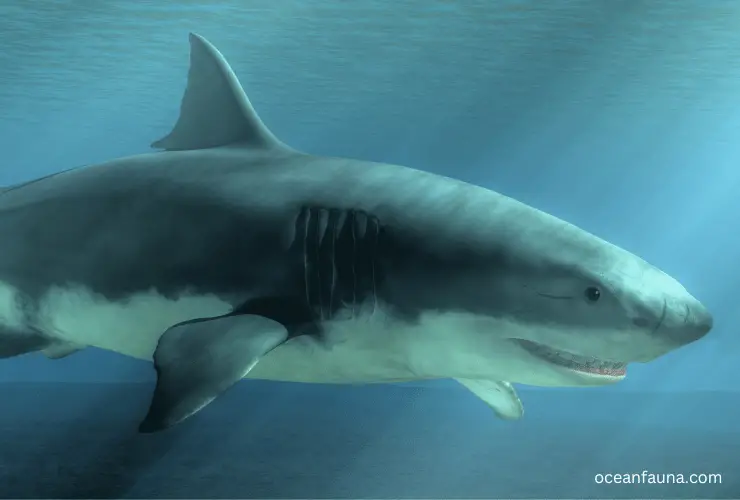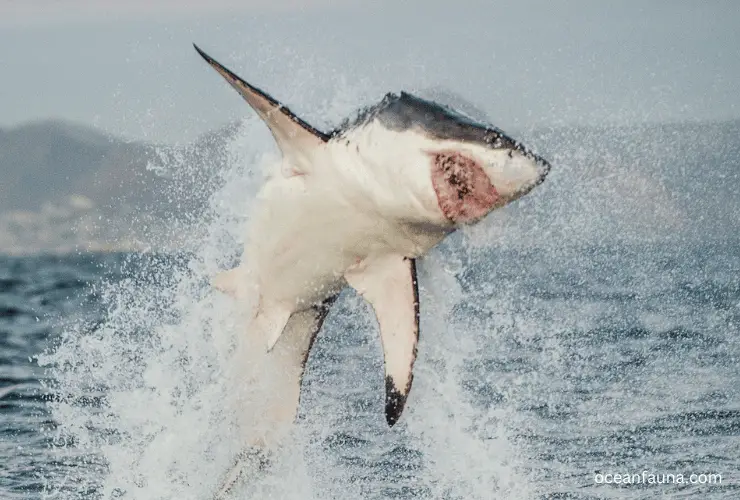Pondering how fast the great white shark can swim? Research reveals that these apex predators generally travel speedily between 25 to 35 miles per hour (40-56 kph).
You’ll frequently find individuals inquiring about great white sharks’ swiftness on social media and forums. Although they may be slower or lethargic in some instances, they are capable of reaching an astounding 56 kilometers per hour at peak performance!
In this article, we will see their swiftness and compare it with sharks. So, let’s dive in.
How Fast Can Great White Sharks Swim?
Great white sharks (Carcharodon carcharias) are renowned for their incredible speeds, which makes them one of the fastest predators in the ocean. Research shows that when traveling across long distances, great whites can reach up to 25 mph (40 kph). This speed is particularly impressive, considering the average swimming speed for large fish is around two mph (3.2 kph).
Great white sharks also have the potential to swim even faster when they are hunting or fleeing predators. Even in case of the short distances, this shark can swim at 56 mph.
In recent years, a team of scientists conducted a study at Seal Island off the coast of South Africa in order to measure and record the top burst speeds of great whites. Their research determined that these apex predators can reach maximum speeds of up to 11 meters per second – equivalent to 39.6 kph or 24.6 mph.
The same study showed that these powerful swimmers can accelerate up to 25 m/s2 (89.1 ft/s2) – more than twice as fast as an Olympic swimmer’s acceleration rate in the water!

Other research has revealed some interesting facts about how great whites move through water at different depths and temperatures. Data collected from tracking devices attached to great whites found that their swimming speed slows dramatically below three meters but increases above this depth.
Similarly, evidence suggests that juvenile sharks are able to maintain higher speeds in cooler waters than their adult counterparts, who may struggle with slower speeds in colder waters.
What Is the Normal Swimming Speed of Great White Sharks?
The normal swimming speed of great white sharks varies significantly, depending on various factors such as the shark’s age, size, and gender. Generally speaking, great white sharks are capable of reaching speeds in excess of 25 mph (40 km/h).
However, they usually swim much slower when searching for prey or just gliding along in their natural habitat. According to one study conducted by the University of California Santa Cruz, juvenile great white sharks can reach top speeds of up to 11 mph (17.7 km/h), while adult specimens commonly reach maximum speeds in the range of 14–18 mph (22–29 km/h).
In addition to these relatively moderate cruising speeds, great white sharks have been documented to sometimes burst into short bursts of speed that easily exceed 30 mph (48 km/h) – a remarkable feat for an animal whose body is adapted for slow yet powerful swimming.
Some scientists suggest that great white sharks may hit speeds nearing 35 mph (56 km/h) during these brief sprints. This hypothesis has been based on observations made through video recordings taken at various locations worldwide and data retrieved via tracking tags attached to live animals.
While most of their typical movements are driven by energy conservation rather than outright speed, great white sharks have been known to swim quite fast when chasing prey or fleeing from potential threats. In fact, due to their muscular bodies and large size – which can measure up to 6 meters (20 feet) in length – these predators are considered among some of the fastest-swimming fish species on earth.
How Long Do Great White Sharks Maintain Their Top Speed?
Depending on the particular specimen and the environment, great white sharks have been recorded maintaining their top speed for anywhere between 10 and 30 seconds. In some cases, this can be only 5-7 seconds.
However, while speed is important for hunting and outrunning predators, great white sharks also need to conserve energy when swimming large distances in search of food. Therefore, they use a combination of cruising speeds and short bursts of speed when necessary. Great whites are known for their ability to swim long distances over periods of days or even weeks at a time.
For instance, one female tagged off South Africa swam 6,835 miles (11,000 kilometers) from South Africa to Australia in just 138 days – averaging about 48 miles per day!
Because of this habit of conserving energy by swimming for long distances at a moderate pace, a great white shark’s top speed is usually only seen during short bursts when attacking prey or evading danger.
While their maximum speed can vary slightly from individual to individual, most great whites maintain an average cruising speed of 3-5 mph (5-8 km/h), with some reaching as high as 12 mph (19 km/h).
Do Great White Sharks Swim at The Same Speed in Both Cold And Warm Water?
As temperatures drop, great white sharks’ movements become noticeably more sluggish.
Research suggests that these majestic creatures thrive in water between 12 and 25°C; anything colder than 12°C makes it increasingly difficult for them to move around as efficiently due to the lack of available oxygen in the water. Consequently, lower temperatures can significantly hinder a great white shark’s ability to reach its full potential.

Evidence suggests that a great white shark may prefer warmer waters for migration purposes as they are believed to regulate their body temperature by using ocean currents.
When it comes to optimal swimming performance, however, research into other species of sharks, such as the tiger shark, has suggested that swimming speeds may be higher in waters closer to 22°C. This could suggest that its performance could be increased in warmer waters due to an increase in available oxygen content and higher muscle efficiency.
Although it is recommended that great whites swim best in waters of a certain temperature, there is presently little scientific evidence to back this up. Moreover, since the body of a great white has its own built-in thermal control system, even if temperatures may be much warmer or cooler than what is considered ideal for peak performance levels, they can still reach high speeds due to their physiological capabilities alone.
How Does the Anatomy of a Great White Shark Allow It To Swim Faster?
The anatomy of a Great White Shark that enables it to swim faster is incredibly adapted for the purpose. Its streamlined body shape helps reduce drag in the water, allowing it to move more quickly with minimal effort. The large, powerful tail is also important for propelling them forward, and its crescent-shaped design helps maximize thrust.
Additionally, their pectoral fins help them maneuver and turn swiftly, which gives them an advantage in hunting prey.
Furthermore, they have two dorsal fins near the back of the body, which help stabilize their movements when swimming at high speeds.
On top of this physical adaptation, their unique physiology helps them reach remarkable speeds. Great Whites have large hearts that can pump up to 10 gallons of blood per minute when they are active and moving rapidly through the water. This allows their muscles to receive more oxygen-rich blood than most other animals, so they can swim faster and longer than most other creatures in the ocean.
Also contributing to a great white’s speed is its ability to “porpoise” – or leap out of the water in short bursts during its pursuit of prey. This technique takes advantage of gravity and momentum, adding even more speed and agility to their movements in the water.
Overall, Great White Sharks possess many physical characteristics that allow them to move efficiently through the water at impressive speeds – aided by a powerful heart and efficient respiration system – making them one of the most formidable predators on earth.
How Fast Do Great White Sharks Swim Than Other Sharks?
Great white sharks are among the fastest swimming of all shark species, capable of reaching burst speeds of up to 25 miles per hour. This makes them much faster than many other species of sharks, such as nurse and dogfish sharks, who generally swim at slower speeds, between 3 and 4 miles per hour.
Also Read: Are Dolphins Faster Than Sharks?
Great white sharks can also sustain relatively high speeds for extended periods, allowing them to cover large distances during their migrations or when pursuing prey.
In addition to swimming fast, great white sharks have been observed performing a behavior known as “porpoising,” which involves leaping out of the water in short bursts. This helps them to move faster and with more agility than they could manage while swimming in a straight line.

Great white sharks are also able to sense their prey from a distance due to the species’ highly-developed electroreceptive organ known as the ampullae of Lorenzini, which can detect electrical signals given off by prey and predators.
This gives them an additional advantage when hunting, as they can pinpoint their target’s location before it has a chance to move out of range.
Are Great White Sharks the Fastest Shark?
No, great white sharks are not the fastest-living sharks, but mako sharks are.
Research has shown that great white sharks are able to swim as fast as 25-35 miles per hour. However, they tend to cruise around a speed of 5-10 miles per hour. Though this is still very quick, it pales in comparison to the shortfin mako shark, which can reach speeds of up to 60 miles per hour.
In addition, other species of sharks, like the thresher shark and porbeagle shark, have been recorded swimming at speeds up to forty and thirty-five miles per hour, respectively. However, their highly developed muscle mass makes the shortfin mako much faster than these other species. It is believed that this not only helps give them amazing speed but also makes them incredibly nimble and agile when hunting for food.
The shortfin mako’s superior speed is due in part to its streamlined body shape, which allows it to move efficiently through the water with minimal drag resistance. Placing its pectoral fins near the back of its body also makes it an efficient swimmer.
Are Great White Sharks Faster Than Their Prey?
Are great white sharks faster than their prey? The answer is a resounding yes! Great white sharks are some of the fastest predators in the ocean, capable of swimming up to 25 miles per hour. This makes them more than capable of out-swimming most of their prey items, from seals and sea lions to fish and squid.
The reason for this impressive speed lies in the structure of the great white shark’s body. Its streamlined shape minimizes water resistance, allowing it to easily slip through the ocean’s waters with minimal effort. It also has large pectoral fins that act as powerful propellors, pushing it forward at incredible speeds.
Furthermore, its caudal fin is large and rigid, which provides additional thrusting power when needed.
In addition to their physical adaptations, great whites have evolved an incredibly efficient hunting strategy that allows them to repeatedly surprise and overtake their targets. They will typically sneak up on unsuspecting prey before rapidly accelerating to full speed in order to close the gap between themselves and their target.
A combination of speed, agility, stealth, and cunning make these formidable creatures some of the most successful predators in existence.
Conclusion
With this information in mind, it’s now clearly understood that a great white shark can maintain an impressive top speed of 40 kph for long distances and 56 kph over short bursts – even lasting several moments!
Further, the mighty great white shark has a major edge over its prey via its remarkable speed, and agility merged with expertly crafted hunting strategies. It is an exceptionally effective hunter that exhibits immense swiftness, strength, and intellect within the deep sea.
With all these impressive adaptations, it’s no wonder that the great white shark is one of the most feared predators in the world.


10 thoughts on “How Fast Can Great White Sharks Swim?”